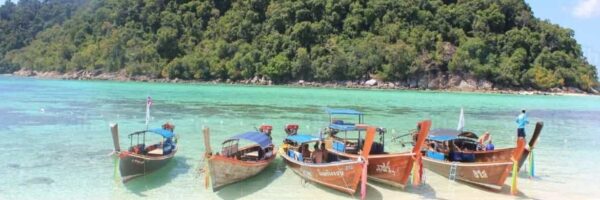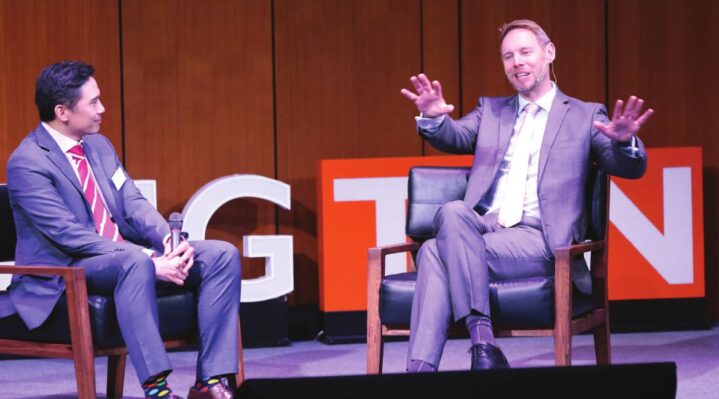
An Incredible Journey: Interview with Julian Thomas
Julian Thomas, the eternally youthful 14th Master of Wellington College Berkshire, UK, recently visited Bangkok for the official launch of Wellington College Bangkok and to participate in a WellingTEN Talk 2018, hosted by Wellington College Bangkok at C-asean Auditorium on 6 March 2018, sharing his thoughts of what is vital with the future of education. Jack Ruenprapan from Wellington College Bangkok had a chance to sit down with him to discover the incredibly unique path Julian has taken, punctuated by
adventures and discovered that have tested the limits of body, mind and spirit.
Jack Ruenprapan: We understand that in 2014, you made an unassisted trek from the coast of Antarctica to the South Pole, a treacherous expedition that only around 300 people have managed to complete since Norwegian explorer Roald Edmunsen managed to complete the journey on 14 December 1911.
How long did that take? Julian Thomas: That’s right. It’s an experience that, looking back on it, always makes me smile. The overall journey took around two months to reach the South Pole.
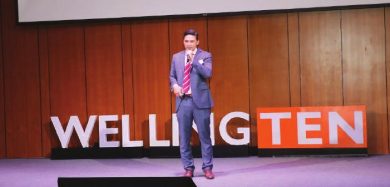
JR: How did you prepare for such a journey?
JT: For two years, I had been preparing for the physical aspect of it, getting myself ready to pull a sled weighing over 90 kilograms.
But what I discovered was that the real tough thing on an expedition like this was the mental aspect. The emotions are very up and down, dealing with a sense of hopelessness and seeing nothing but white all around you. Looking at the yellow dots on our satellite navigation, and seeing, after 11 hours of dragging this sled, that it hasn’t appeared to move from the previous day.
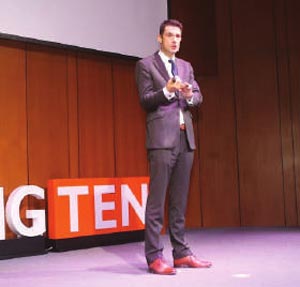
JR: So did you and your team have moments where you were saying to yourselves, “This is too much. We should think about heading back.”
JT: Actually, we started out as a team of five, but we finished as a team of four. Don’t worry, we didn’t eat him! There was a medical evacuation, when the plane arrived to take one of our party away, they asked “Anyone else?” And as mentally and physically exhausting as it was, there was only one answer.
It was something I was desperate to do, to the point of obsession. JR: There was a concurrent British expedition led by Captain Robert Scott, which managed to reach the South Pole but the team perished on the return journey. JT: Yes, it’s funny you mention Captain Scott, as he was a major inspiration for my trip.
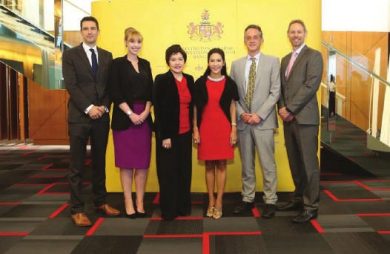
I had one those Ladybird Adventure books as a nine year old, and it was “Captain Scott’s Adventures in Antarctica” and from then on, I always wanted to go there. So just being in Antarctica there was a real sense of connection with him and his team, as well as the other great Edwardian explorers like Shackleton.
But I would never, even remotely, put myself up against those incredible people, who did it with terrible equipment, it was uncharted territory, and if something when wrong there was no rescue plane to call. They were true heroes. JR: And you went from the extreme cold to extreme heat with a later adventure, running in the Marathon des Sable, covering over 270 kilometres, the equivalent of six marathons over six days, back to back, in the Sahara Desert.
What were you thinking there?
JT: Lots of people say, “What were you thinking?” and I suppose it’s being a bit crazy; I love pushing myself, setting myself challenges. Having tested myself in the cold, and wanted to see if I could do it in extreme heat. There is this thing called The Hundred Club, which, once I heard about it, I couldn’t shake it. It’s where if you do an expedition where there is a difference of 100 degrees between the two extremes, then you qualify. So with minus 50 degrees in Antarctica and over 50 degrees Celsius in the Sahara, I got to join the Hundred Club.

JR: And these were not just for personal glory, but also for good causes?
JT: Yes, for the Marathon des Sables, we raised money for building a school in Africa and the Antarctica expedition raised money for Bliss the charity for premature babies.JR: Any more mountains to climb, literally or figuratively? JT: Well, Everest is still there, that would be wonderful someday. It’s always been an ambition of mine. But in three weeks I begin my skydiving training to become a licensed skydiver.
The whole idea of standing at the edge of airplane getting ready to jump out absolutely terrifies me to the core, which is what makes it so much fun. I know something like this is going to take me to the limits of what I think I can do. JR: I understand your journey to becoming an educator was not as straightforward as most, having started out in IT in the business and finance world.
What was that Eureka moment for you?
JT: Yes, there was a time I was working in IT in the City of London, and I was convinced that was going to be my career from then on, but I remember I was about five years into my career in the City, working with BP, and I was going up the escalator at Liverpool Station and thinking about the day ahead, and I was dreading it.
I knew I would be spending most of the day looking at the clock waiting for the time to go. On that escalator ride, I had a moment of realisation that I couldn’t do this for the rest of my life. I needed to do something that had meaning to me, that mattered to me, that got me out of bed every day and inspired me, because I wasn’t inspired by what I was doing.
I decided I wanted to be a teacher. By the end of that day, I had contacted universities sign up for my PGCE teacher training qualifications, as first step to becoming a teacher. I’m so glad I did, because I know it sounds sugary, but now I wake up every day looking forward to the day ahead, and I know every day is going to offer something different.
I still watch the clock, but it’s hoping that it will slow down because I have so much I still want to accomplish. JR: At Wellington College do you have any ambitions for the school to do something along the lines of these adventures and challenges?
JT: Well, I think by doing things like this you learn a lot and you get incredibly inspired, but what I really, really want to do with Wellington is for every child to find the thing that makes them tick, and for me it’s these kinds of extreme challenges, but every single child has the potential to become inspired by the thing they really enjoy doing. I believe children who are really disengaged with school, it’s because they haven’t found that thing they love to do most.
I’m so glad I had that epiphany of what I wanted to do on that elevator ride, which led me to Wellington, and now here to Bangkok to share my experiences. What an amazing journey it has been.



